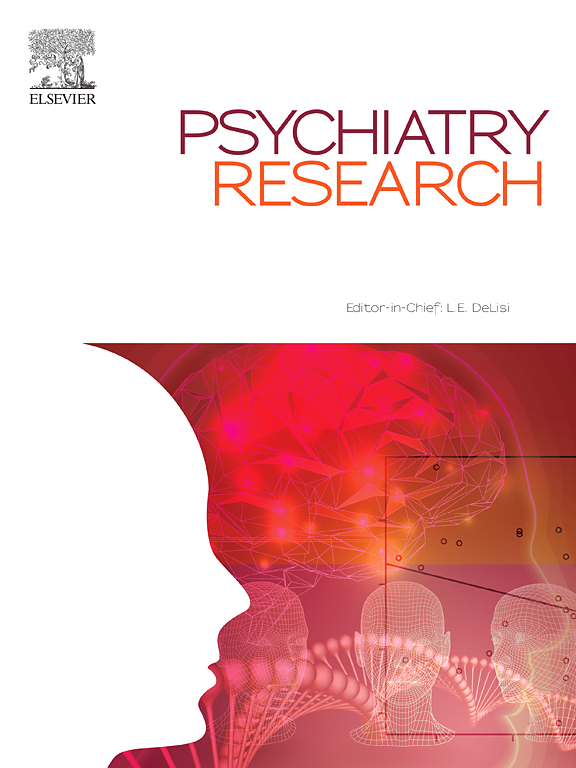A 4-week morning light treatment reduces amygdala reactivity and clinical symptoms in adults with traumatic stress
IF 4.2
2区 医学
Q1 PSYCHIATRY
引用次数: 0
Abstract
Trauma leads to mental health problems including posttraumatic stress disorder (PTSD), depression, and anxiety. New treatments are needed for traumatic stress that can overcome barriers to care while targeting underlying biological mechanisms of the pathology. Morning light treatment has potential as a novel intervention for traumatic stress. We conducted a randomized clinical trial testing 3 doses of a 4-week morning light treatment in people with traumatic stress to evaluate brain mechanisms underlying the treatment. Forty-six participants completed a baseline week followed by a 4-week morning light treatment (15, 30 or 60 mins each morning). Functional magnetic resonance imaging was conducted at pre- and post-treatment using an emotional faces task to probe the amygdala, based on prior work showing direct effects of light on the amygdala and the role of amygdala in traumatic stress. Clinician-rated symptoms and self-reported symptoms were also assessed at pre- and post-treatment. No group differences were observed in left amygdala reactivity, but right amygdala reactivity reduced only in the 30 and 60 min groups with medium effect sizes. Clinical symptoms reduced in all groups with medium to large effect sizes. Self-reported depression and anxiety scores reduced more in the 60 min than in the 15 min group (p = .02). The results suggest that 4 weeks of morning light treatment of at least 30 min per day can reduce amygdala reactivity and symptoms of traumatic stress. Morning light treatment should be further explored as a potential treatment for traumatic stress, given it is relatively safe, acceptable, accessible and scalable.
为期 4 周的晨光治疗可降低创伤应激成人的杏仁核反应和临床症状
创伤会导致心理健康问题,包括创伤后应激障碍(PTSD)、抑郁症和焦虑症。创伤应激需要新的治疗方法,以克服治疗障碍,同时针对潜在的病理生物机制。晨光治疗作为一种新型创伤应激干预方法具有潜力。我们进行了一项随机临床试验,对创伤应激患者进行了为期 4 周的 3 种晨光治疗剂量的测试,以评估治疗的大脑机制。46 名参与者在完成基线周后接受了为期 4 周的晨光治疗(每天早上 15、30 或 60 分钟)。在治疗前和治疗后进行了功能磁共振成像,使用情绪面孔任务来探测杏仁核,这是基于之前的研究表明光对杏仁核有直接影响,以及杏仁核在创伤应激中的作用。治疗前后还对临床医生评定的症状和自我报告的症状进行了评估。在左侧杏仁核反应性方面没有观察到组间差异,但右侧杏仁核反应性仅在 30 分钟和 60 分钟组中有所降低,影响大小为中等。所有治疗组的临床症状都有所减轻,效果中等或较大。与 15 分钟组相比,60 分钟组的自我报告抑郁和焦虑得分降低幅度更大(P = 0.02)。研究结果表明,每天至少 30 分钟、为期 4 周的晨光治疗可以降低杏仁核反应和创伤应激症状。鉴于晨光治疗相对安全、可接受、易获得且可扩展,因此应将其作为一种潜在的创伤应激治疗方法进行进一步探索。
本文章由计算机程序翻译,如有差异,请以英文原文为准。
求助全文
约1分钟内获得全文
求助全文
来源期刊

Psychiatry Research
医学-精神病学
CiteScore
17.40
自引率
1.80%
发文量
527
审稿时长
57 days
期刊介绍:
Psychiatry Research offers swift publication of comprehensive research reports and reviews within the field of psychiatry.
The scope of the journal encompasses:
Biochemical, physiological, neuroanatomic, genetic, neurocognitive, and psychosocial determinants of psychiatric disorders.
Diagnostic assessments of psychiatric disorders.
Evaluations that pursue hypotheses about the cause or causes of psychiatric diseases.
Evaluations of pharmacologic and non-pharmacologic psychiatric treatments.
Basic neuroscience studies related to animal or neurochemical models for psychiatric disorders.
Methodological advances, such as instrumentation, clinical scales, and assays directly applicable to psychiatric research.
 求助内容:
求助内容: 应助结果提醒方式:
应助结果提醒方式:


